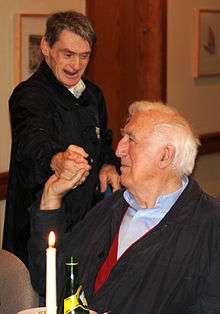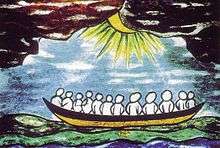Jean Vanier
| Jean Vanier | |
|---|---|
.jpg) Jean Vanier in 2012 | |
| Born |
September 10, 1928 Geneva, Switzerland |
| Known for | Founder of L'Arche |
| Religion | Roman Catholic |
| Relatives |
Georges Vanier, father Pauline Vanier, mother Thérèse Vanier, sister |
| Awards |
|
| Website |
www |
Jean Vanier, CC GOQ (born September 10, 1928) is a Canadian Catholic philosopher, theologian and humanitarian. He founded L'Arche in 1964, an international federation of communities spread over 35 countries, for people with developmental disabilities and those who assist them.[1] Subsequently in 1971, he co-founded Faith and Light, with Marie-Hélène Mathieu, which also works for people with developmental disabilities, their family and friends in over 80 countries. He continues to live as a member of the original L'Arche community in Trosly-Breuil, France.
Over the years, he has authored 30 books on religion, disability, normality, success and tolerance.[2] Among the honors he has received are the Companion of the Order of Canada (1986),[3] Grand Officer of the National Order of Quebec, French Legion of Honour (2003), Community of Christ International Peace Award (2003), the Pacem in Terris Peace and Freedom Award (2013) and the Templeton Prize (2015).
Early years and background
Vanier is the son of Major-General Georges Vanier, who became the 19th Governor General of Canada (1959-1967), and his wife Pauline Vanier. He was born in Geneva, while his father was on diplomatic service in Switzerland. Fourth of five siblings, in his youth, Vanier received a broad education in English and French first in Canada, and then England and France. He joined the Royal Navy at the Dartmouth Naval College (later renamed Britannia Royal Naval College) in England at age 13. During World War II, Vanier and his family fled Paris just before the Nazi occupation. He spent much of the War at an English naval academy, preparing for a career as a naval officer.[4][5][6]
In early 1945, Vanier was visiting Paris where his father was Canadian Ambassador; he and his mother went to assist survivors of Nazi concentration camps. Seeing the emaciated victims, their faces twisted with fear and anguish, was a profoundly moving encounter for him, which he never forgot. Shortly thereafter, at age seventeen, with World War II still raging, he served with the Royal Navy and then with the Royal Canadian Navy. In 1947 as a midshipman, Vanier accompanied the Royal Family on their tour of South Africa aboard HMS Vanguard.
In 1949, he joined the Royal Canadian Navy, at the carrier HMCS Magnificent. However, in 1950, feeling a strong inner spiritual calling to do “something else,” he resigned his naval commission. Vanier travelled to Paris to study as an undergraduate. He eventually went on to complete a PhD in philosophy from the Institut Catholique de Paris, with a doctoral thesis on Aristotle, which was published in 1966 as Happiness as Principle and End of Aristotelian Ethics, also his first published work. He subsequently went to write several books during his career and taught philosophy at the University of St. Michael's College, University of Toronto.[6] Vanier left academia in 1964 seeking more spiritual work.
Foundation of L'Arche
In 1964, through Vanier's friendship with a priest named Father Thomas Philippe, he became aware of the plight of thousands of people institutionalised with developmental disabilities. Vanier invited two men, Raphael Simi and Philippe Seux, to leave the institutions where they resided and live with him in Trosly-Breuil, France. Their time together led to the establishment of L'Arche at Trosly-Breuil, a community for people with disabilities to live with those who cared for them. Since that time L'Arche communities have been established in countries around the world. A governing philosophy of the communities is Vanier's belief that people with disabilities are teachers, rather than burdens bestowed upon families.[7]
Until the late 1990s, Jean Vanier carried the responsibility for L'Arche in Trosly-Breuil in France, and for the International Federation of L'Arche. He stepped down to spend more time counseling, encouraging and accompanying the people who come to live in L'Arche as assistants to those with disabilities. Vanier has established 147 L'Arche communities in 35 countries around the world which have become places of pilgrimage for those involved.[8]
Later life


In 1968, Jean Vanier gave a Faith and Sharing retreat in Marylake, Ontario the first of a movement of retreats where people from many walks of life are welcome.[9] The retreats continue today as part of the Faith and Sharing Federation.[10] As of 2013, there are 13 communities in North America that organize annual retreats and days of prayer.[11] Faith and Sharing member Bill Clark, SJ explains: "There is then a two-fold movement in Faith and Sharing: an inward movement towards God hidden in the depths of our own vulnerability, and an outward movement towards our brothers and sisters, especially those who are more poor and in need." [9] The organization's records are housed at the John M. Kelly Library, University of St. Michael's College.[12]
In 1971, he co-founded Faith and Light with Marie-Hélène Mathieu,. It is an international movement of forums for people with developmental disabilities, their family and friends. Today there are over 1,800 Faith and Light communities in 80 countries around the world.[6]
Vanier still makes his home in the original L'Arche community of Trosly-Breuil, France. He travels widely, visiting other L'Arche communities, encouraging projects for new communities, and giving lectures and retreats.. He was the 1998 Massey lecturer focusing on the theme of "Becoming Human".[13] During one of his lectures he touched on his distaste for barriers around people with intellectual disabilities, a motivating philosophy behind L'Arche: "We must do what we can do diminish walls, to meet each other. Why do we put people with disabilities behind walls?"[7]
Awards and honours
He has received numerous awards for his work, including the Companion of the Order of Canada, the Legion of Honour (France, 2003)[14] and many awards from faith groups, among them the Paul VI International Prize, the Community of Christ International Peace Award, the Rabbi Gunther Plaut Humanitarian Award, and the Gaudium et Spes Award, named after the Second Vatican Council's Gaudium et spes document.[15]
In November 2004, a CBC poll ranked him as number 12 in a list of Greatest Canadians.[15]
In 2010, the asteroid 8604 was officially named Vanier in his honour.[16]
In 2013 he received the United States-based Pacem in Terris Peace and Freedom Award, established by a coalition of Catholic dioceses in the Midwest.[17]
In March 2015 Vanier was awarded the Templeton Prize in recognition of his advocacy for people with disabilities and his contributions to a broader exploration of helping the weak and vulnerable.[18][19]
On September 27, 2016, Jean Vanier received The Peace Abbey Foundation (USA) Int'l Courage of Conscience Award in Trosly-Breuil, France for his lifelong commitment to building a world of inclusion for individuals with disabilities.
Schools named after Jean Vanier
Schools have been named in his honor in Whitehorse, Yukon; London, Ontario; Scarborough, Ontario; Collingwood, Ontario; Richmond Hill, Ontario; Welland, Ontario; Sherwood Park, Alberta and, most recently, Milton, Ontario.[20]
- École Catholique Jean-Vanier, Kirkland Lake, Ontario
- Jean Vanier Catholic High School, Collingwood, Ontario
- Jean Vanier Catholic High School, Richmond Hill, Ontario
- Jean Vanier Catholic Secondary School, Scarborough, Ontario
- Jean Vanier Catholic School, Sherwood Park, Alberta
- Jean Vanier Catholic Secondary School Milton, Ontario
Published works
Books
- In weakness, strength: The spiritual sources of General the Rt. Hon. Georges P. Vanier, 19th Governor-General of Canada. Toronto: Griffin House. 1969. OCLC 77213.
- Tears of silence. Toronto: Griffin. 1970. OCLC 395235248.
- Eruption to hope. Toronto: Griffin House. 1971. OCLC 838694372.
- Followers of Jesus. Toronto: Griffin Press. 1973.
- Be not afraid. Toronto: Griffin House. 1975. OCLC 494744391.
- Community and growth: Our pilgrimage together. Toronto: Griffin House. 1979. OCLC 6277986.
- The Challenge of L’Arche. Ottawa: Novalis. 1981. OCLC 8872141.
- I meet Jesus : he tells me 'I love you', story of the love of God through the Bible. Ramsay, N.J.: Paulist Press. 1981. OCLC 15975370.
- I walk with Jesus. Mahwah, N.J.: Paulist Press. 1985. OCLC 14227091.
- Man and woman He made them. Mahwah, N.J.: Paulist Press. 1985. OCLC 13025956.
- Jesus, the gift of love. London: Hodder & Stoughton. 1988. OCLC 895940048.
- The broken body. Mahwah, N.J.: Paulist Press. 1988. OCLC 17694012.
- Images of love, words of hope. Hantsport, N.S.: Lancelot Press. 1991. OCLC 25369178.
- A network of friends, volume one : 1964-1973 : the letters of Jean Vanier to the friends and communities of L'Arche. Hantsport, N.S.: Lancelot Press. 1992. OCLC 317449807.
- From brokenness to community. New York: Paulist Press. 1992. OCLC 25409710.
- An ark for the poor: the story of L’Arche. Ottawa: Novalis. 1995. OCLC 32546881.
- The heart of L’Arche: A spirituality for every day. Toronto: Novalis. 1995. OCLC 33333740.
- The scandal of service: Jesus washes our feet. Ottawa: Novalis. 1996. OCLC 36698314.
- Our journey home: Rediscovering a common humanity beyond our differences. Ottawa: Novalis. 1997. OCLC 35919344.
- Vanier, Jean; Andreu, Anne-Sophie; Quoist, Michel (1996). A door of hope. London: Hodder & Stoughton. OCLC 60292140.
- Becoming Human. Toronto: Anansi. 2001. OCLC 654379327.
- Made for happiness: Discovering the meaning of life with Aristotle. London: Darton, Longman & Todd. 2001. OCLC 47824661.
- Seeing beyond depression. London: SPCK. 2001. OCLC 46810914.
- Finding peace. Toronto: House of Anansi Press. 2003. OCLC 52644543.
- Drawn into the mystery of Jesus through the Gospel of John. New York: Paulist Press. 2004. OCLC 892517848.
- Befriending the stranger. Toronto: Novalis. 2005. OCLC 66031013.
- Our life together: A memoir in letters. London: Darton Longman Todd. 2008. OCLC 260043937.
- Vanier, Jean; Hauerwas, Stanley (2008). Living gently in a violent world: The prophetic witness of weakness. Downers Grove, Ill.: IVP Books. OCLC 837379461.
- From Brokenness to Wholeness. Singapore: MEDIO MEDIA. 2012. OCLC 858345447.
- The Gospel of John, the Gospel of Relationship. Cincinnati: Franciscan Media, 2015. ISBN 978-1-61636-890-6.
- Life's Great Questions. Cincinnati: Franciscan Media, 2015. ISBN 978-1-61636-941-5.
References
- ↑ L'Arche Page
- ↑ "Jean Vanier: Philosopher who dislikes the 'religion' of success wins £1.2m Templeton Prize for promoting spiritual awareness". The Independent. 11 March 2015. Retrieved 2015-06-02.
- ↑ "Order of Canada: Jean Vanier, C.C., G.O.Q., D.Ph.". The Governor General of Canada website. Retrieved 2015-06-01.
- ↑ "The Man: Early Years", Jean-Vanier Official Website
- ↑ Freeman, Mac (February 3, 2008). "Jean Vanier". The Canadian Encyclopedia (online ed.). Historica Canada. Retrieved March 11, 2015.
- 1 2 3 "Brief Chronology". Jean Vanier - Becoming Human]. Retrieved January 14, 2015.
- 1 2 Scrivener, Leslie. "Canada's disciple to the disabled".
"He is wary of institutions. The theme in last night's lecture was his fear of the walls that separate people. "We must do what we can to diminish walls, to meet each other. Why do we put people with disabilities behind walls?
- ↑ "Jean Vanier - The Wisdom of Tenderness". On Being with Krista Tippett. Retrieved June 11, 2015.
- 1 2 "The Grace of Faith and Sharing" (PDF). Faith and Sharing Federation. July 1988. Retrieved July 23, 2014.
- ↑ "Faith and Sharing Federation". Faith and Sharing Federation. Retrieved July 23, 2014.
- ↑ "L'Arche, Faith and Sharing, Faith and Light" (PDF). Faith and Sharing Federation. Retrieved July 23, 2014.
- ↑ "Faith and Sharing Federation fonds". John M. Kelly Library Archival and Manuscript Collections. University of St. Michael's College. Retrieved July 23, 2014.
- ↑ Nagy, Elizabeth. "The 1998 CBC Massey Lectures, "Becoming Human"". CBC. Retrieved July 28, 2015.
- ↑ "Awards to Canadians". Canada Gazette. Retrieved February 2, 2012.
- 1 2 "Top 100 Greatest Canadians". Archived from the original on 2010-07-22. Retrieved February 2, 2012.
- ↑ The citation and more information are found by entering this number or name in the JPL Small-Body Database.
- ↑ Deirdre Baker (2013-06-17). "Award presentation to be in France". Quad-City Times. Retrieved 2013-08-06.
- ↑ "Current Winner". Templeton Prize. John Templeton Foundation. March 11, 2014. Retrieved March 11, 2015.
- ↑ Ha, Tu Thanh (March 11, 2015). "Canadian wins $2-million international prize for work 'affirming life's spiritual dimension'". The Globe and Mail. Retrieved March 11, 2015.
- ↑ "Board Announces Name for New Catholic Secondary School in Milton". Halton Catholic District School Board. March 6, 2013. Retrieved July 23, 2014.
External links
| Wikimedia Commons has media related to Jean Vanier. |
| Wikiquote has quotations related to: Jean Vanier |
- Vanier, Jean. "The Wit Lectures: Harvard University the Divinity School." From Brokenness to Community, Mahwah: Paulist Press, 1992.
- Vanier's official website
- Faith and Sharing Federation
- L'Arche International
- L'Arche Canada
- L'Arche Atlantic Region (Canada)
- L'Arche Daybreak - Richmond Hill, Ontario, Canada
- L'Arche in Latinamerica /El Arca en Latinoamerica
- L'Arche Zimbabwe
- L'Arche Kent
- L'Arche Mexico
- Pensamientos de Jean Vanier en Español
